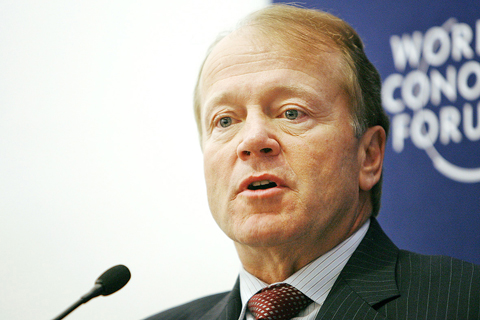Cisco Systems Inc threw down the gauntlet to erstwhile partners Hewlett-Packard (HP) and IBM on Monday and announced it would begin building computer servers.
John Chambers, the chief executive of Cisco, which has enjoyed spectacular growth making networking hardware such as routers and switches for the Internet and for corporations, unveiled the shift into an area dominated until now by HP and IBM.
Cisco’s move into building blade servers is part of its Unified Computing System (UCS), a next-generation data center platform for corporations seeking to boost efficiency and save energy costs.

PHOTO: BLOOMBERG
Firms such as Microsoft, Accenture, VMware Inc, BMC Software and EMC Corp are joining Cisco in the UCS project, offering their expertise in software.
HP, IBM and Cisco had been working largely as partners until now in what the New York Times has described as a “symbiotic” relationship.
HP manufactured the servers for the Internet and for corporate data centers, where companies store and process information, and Cisco provided the switches and routers which tied them together.
But Cisco chief technology officer Padmasree Warrior told the Wall Street Journal the San Jose, California-based company would now be competing with HP.
“We’re going to compete with HP. I don’t want to sugarcoat that,” she said. “There is bound to be change in the landscape of who you compete with and who you partner with.”

MORE VISITORS: The Tourism Administration said that it is seeing positive prospects in its efforts to expand the tourism market in North America and Europe Taiwan has been ranked as the cheapest place in the world to travel to this year, based on a list recommended by NerdWallet. The San Francisco-based personal finance company said that Taiwan topped the list of 16 nations it chose for budget travelers because US tourists do not need visas and travelers can easily have a good meal for less than US$10. A bus ride in Taipei costs just under US$0.50, while subway rides start at US$0.60, the firm said, adding that public transportation in Taiwan is easy to navigate. The firm also called Taiwan a “food lover’s paradise,” citing inexpensive breakfast stalls

TRADE: A mandatory declaration of origin for manufactured goods bound for the US is to take effect on May 7 to block China from exploiting Taiwan’s trade channels All products manufactured in Taiwan and exported to the US must include a signed declaration of origin starting on May 7, the Bureau of Foreign Trade announced yesterday. US President Donald Trump on April 2 imposed a 32 percent tariff on imports from Taiwan, but one week later announced a 90-day pause on its implementation. However, a universal 10 percent tariff was immediately applied to most imports from around the world. On April 12, the Trump administration further exempted computers, smartphones and semiconductors from the new tariffs. In response, President William Lai’s (賴清德) administration has introduced a series of countermeasures to support affected

CROSS-STRAIT: The vast majority of Taiwanese support maintaining the ‘status quo,’ while concern is rising about Beijing’s influence operations More than eight out of 10 Taiwanese reject Beijing’s “one country, two systems” framework for cross-strait relations, according to a survey released by the Mainland Affairs Council (MAC) on Thursday. The MAC’s latest quarterly survey found that 84.4 percent of respondents opposed Beijing’s “one country, two systems” formula for handling cross-strait relations — a figure consistent with past polling. Over the past three years, opposition to the framework has remained high, ranging from a low of 83.6 percent in April 2023 to a peak of 89.6 percent in April last year. In the most recent poll, 82.5 percent also rejected China’s

PLUGGING HOLES: The amendments would bring the legislation in line with systems found in other countries such as Japan and the US, Legislator Chen Kuan-ting said Democratic Progressive Party (DPP) Legislator Chen Kuan-ting (陳冠廷) has proposed amending national security legislation amid a spate of espionage cases. Potential gaps in security vetting procedures for personnel with access to sensitive information prompted him to propose the amendments, which would introduce changes to Article 14 of the Classified National Security Information Protection Act (國家機密保護法), Chen said yesterday. The proposal, which aims to enhance interagency vetting procedures and reduce the risk of classified information leaks, would establish a comprehensive security clearance system in Taiwan, he said. The amendment would require character and loyalty checks for civil servants and intelligence personnel prior to